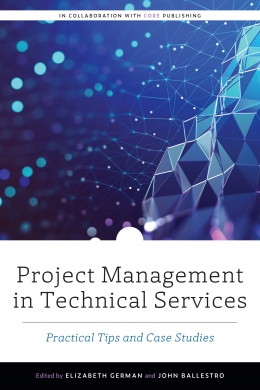Primary tabs
You don't need to be an ALA Member to purchase from the ALA Store, but you'll be asked to create an online account/profile during checkout to proceed. This Web Account is for both Members and non-Members. Note that your ALA Member discount will be applied at the final step of the checkout process.
If you are Tax-Exempt, please verify that your account is currently set up as exempt before placing your order, as our new fulfillment center will need current documentation. Learn how to verify here.
- Description
- Table of Contents
- About the authors
- Reviews
Supported by real-world examples drawn from both personal context and at the departmental level, this easy-to-follow guide presents practical ideas for incorporating project management techniques into technical services work.
Project management, as both a skill set and a discipline, offers structure and a path forward for continual improvement and change management within libraries. Most importantly for technical services, project management creates processes that can fairly and transparently indicate how resources are allocated and guide technical services departments as they prioritize needs. Helping staff build their own project management toolkit, this book will allow readers to pick and choose which practices work best for their own situation. You will
- discover ways to integrate project management skills into your daily work;
- learn how to apply project management at a departmental level; and
- delve into case studies which illuminate issues related to technology, including library management system migrations, digital repository development, and electronic resource management, as well as common scenarios like high density storage and weeding, and moving or consolidating collections.
Preface
Acknowledgments
Part I: Implementation Perspectives
Chapter 1: We Need to Make a Plan: A Journey and Guide to Project Management
Robyn M. Gleasner
Chapter 2: Mastering Time in Personal Project Management
Andrea Miller
Chapter 3: Personal Project Management in Theory and Practice
Heather M. Campbell
Chapter 4: Turning Big-Picture Objectives into Quarterly Deliverables
Michelle Bowers
Chapter 5: Project Management with a Lowercase “p”: Integrating Project Management Principles into Everyday Technical Services Work
Beth Ashmore. Maria Collins, and Lynn Whittenberger
Chapter 6: People Management before Project Management: Creating a Healthy Work Culture to Improve Project Collaboration and Outcomes
Laurie Palumbo and Kerry Walton
Part II: Case Studies
Chapter 7: Agile Electronic Resource and Systems Management
Geraldine Rinna
Chapter 8: Consortial Projects: Centralized vs. Decentralized Approaches
Jaime Taylor
Chapter 9: Corralling CORAL: An Integrated Project Management Approach to Systems Migration
Anastasia Guimaraes and Jessica Morales
Chapter 10: Technical Services and the Project Management Approach to Library Renovations
Laura Turner
Chapter 11: What’s Next? Project Management for Moving or Closing a Library
Alison Downey
Chapter 12: Notice to Vacate: How to Move Out, Move In, and Move On
Kerri Goergen-Doll, Brad Engelbert, Laura Ramos, and Margarita Zamora Saunders
Chapter 13: Project Management in High-Density Storage: How to Plan for Evolving Needs
Jennifer A. Maddox Abbott and Mary S. Laskowski
Chapter 14: Project Management for Weeding Library Collections: A Case Study at Kennesaw State University
Xueying Chen and Ana B. Guimaraes
About the Contributors
Index
Elizabeth German
Elizabeth German is the assistant director for library assessment and user experience at Princeton University Library. Previously she was an associate professor and the service design librarian at Texas A&M University Libraries, where she focused on bringing together user experience, project management, and accessibility in order to provide quality user experiences for researchers and learners. She holds a Project Management Professional (PMP) certification from the Project Management Institute.
John Ballestro
John Ballestro is the director of collection development and acquisitions services and the subject selector for graphic novels at Texas A&M University’s Sterling C. Evans Library. He is an avid comic book reader, likes Kirk over Picard, and his house words could be “Winter is Coming” but is more likely to be "Wednesday is new comics day!”
Core
The former Association for Library Collections and Technical Services (ALCTS), the Library Information Technology Association (LITA), and the Library Leadership and Management Association (LLAMA) are now Core: Leadership, Infrastructure, Futures, a new division of ALA. Its mission is to cultivate and amplify the collective expertise of library workers in core functions through community building, advocacy, and learning.
Have you read this book? Leave a review!
"Project management as a skill and discipline has been adapted from the business world and may be underutilized in service environments such libraries. Project management is particularly difficult to implement in technical services, where daily work does not often lend itself to large team-oriented projects. There are, however, many aspects of technical services work that can be efficiently handled using project management skills, such as weeding projects, shifting books, and moving or closing entire libraries ... While one must take care that the costs of project management don’t outweigh the benefits, this work provides tools and examples to provide a solid starting point for interested librarians. Recommended reading for library administrators and technical services librarians.”
— Library Journal
"Readers desiring a quick introduction to project management, but perhaps not feeling up to a more intense or in-depth work, can choose their topics and library settings of interest ... There is likely something to be gained from any and all chapters, however. ... [This collection] provides an accessible entry point for project management newcomers, as well as useful case studies to build applied knowledge for nonbeginners.”
— Technicalities
"So much library work today is project based, and experienced technical services staff will be familiar with the types of projects described in the book. It is very useful to learn from the project process, documentation, examples and individual experiences, both good and bad, recounted by the contributors, to apply the lessons to new projects. This book is highly recommended to all technical services professionals, as we all need to be project managers to some degree."
— Journal of the Australian Library and Information Association



